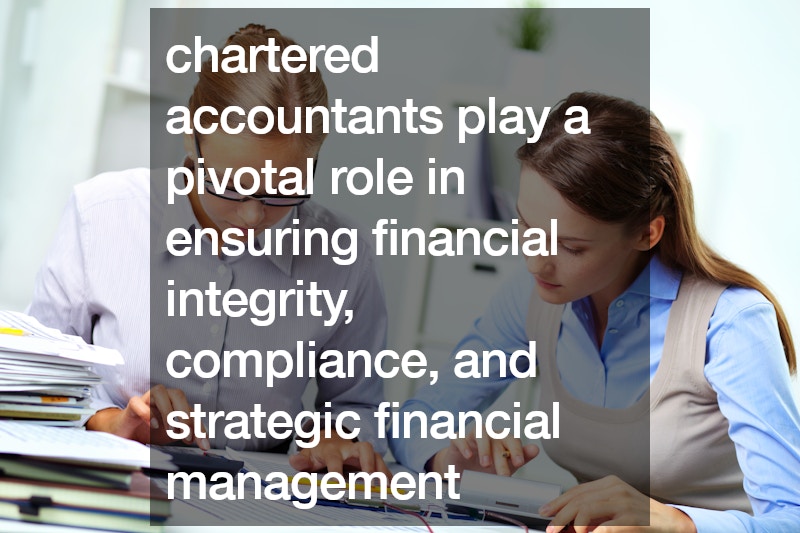In the realm of finance and business, chartered accountants play a pivotal role in ensuring financial integrity, compliance, and strategic financial management. This article delves into the multifaceted responsibilities of chartered accountants, their qualifications, and the significance of their contributions to organizations and individuals alike.
Who Are Chartered Accountants?
Chartered accountants (CAs) are professional accountants who have obtained the highest qualification in their field.
They are members of prestigious professional bodies or institutes that certify their expertise and ethical standards. In many countries, including the UK, Canada, Australia, and India, becoming a chartered accountant involves rigorous education, training, and passing comprehensive examinations.
Qualifications and Education
To become a chartered accountant, individuals usually takes up a bachelor’s degree in accounting or a related field. Following this, aspiring CAs must complete a recognized professional qualification program, such as the Chartered Accountancy (CA) program, which combines theoretical knowledge with practical experience in areas like auditing, taxation, financial reporting, and management accounting.
The qualification process varies by country and professional body but generally includes passing multiple levels of exams and accumulating practical work experience under the guidance of experienced professionals. This rigorous training ensures that chartered accountants possess a deep understanding of financial principles, legal regulations, and ethical standards governing their profession.
Roles and Responsibilities
Chartered accountants fulfill diverse roles across various sectors, contributing their expertise to financial management, auditing, taxation, and advisory services. Their responsibilities include:
Financial Reporting and Analysis
One of the primary responsibilities of chartered accountants is to prepare accurate and transparent financial statements that reflect the financial health of an organization. They analyze financial data, identify trends, and provide insights to stakeholders, helping them make informed decisions.
Auditing and Assurance
Chartered accountants conduct audits to verify the accuracy of financial statements and ensure compliance with regulatory requirements. Auditing provides assurance to shareholders, investors, and other stakeholders about the reliability and integrity of financial information.
Taxation
CAs provide tax planning and advisory services to individuals and businesses, helping them navigate complex tax laws and regulations. They ensure compliance with tax obligations while optimizing tax strategies to minimize liabilities and maximize savings.
Advisory and Consultancy
Beyond traditional accounting and auditing roles, chartered accountants serve as trusted advisors to businesses, offering strategic guidance on financial management, risk assessment, mergers and acquisitions, and corporate governance. Their expertise helps organizations achieve financial goals and navigate challenges in a dynamic business environment.
Compliance and Ethics
Chartered accountants uphold high ethical standards and integrity in their practice. They adhere to professional codes of conduct and regulatory requirements to maintain trust and confidence in financial reporting and business operations.
Industry Specializations
Chartered accountants often specialize in specific industries or sectors, such as banking, healthcare, manufacturing, or public accounting firms. Their specialized knowledge enables them to address industry-specific challenges and provide tailored solutions to meet client needs effectively.
Importance to Businesses and Individuals
The role of chartered accountants is indispensable to both businesses and individuals seeking financial clarity, compliance, and strategic direction. For businesses, CAs contribute to operational efficiency, risk management, and sustainable growth. They provide crucial insights that support decision-making and enhance financial performance.
For individuals, chartered accountants offer personalized financial advice, tax planning, and wealth management services. They help individuals achieve financial goals, plan for retirement, manage investments, and navigate personal financial challenges with confidence.
The Future of Chartered Accountancy
As businesses evolve and global financial landscapes become increasingly complex, the demand for chartered accountants continues to grow. CAs are expected to adapt to technological advancements, such as automation and data analytics, to enhance efficiency and deliver value-added services. Their role as strategic advisors and guardians of financial integrity remains pivotal in shaping organizational success and sustainability.
Conclusion
Chartered accountants play a vital role in the financial ecosystem, serving as guardians of financial integrity, strategic advisors, and compliance experts. Their rigorous education, specialized knowledge, and ethical standards make them indispensable to businesses and individuals alike. By upholding professionalism, integrity, and continuous learning, chartered accountants contribute to economic stability, corporate governance, and financial well-being in a rapidly changing world. Their multifaceted roles ensure that organizations and individuals can navigate financial challenges, achieve growth, and thrive in today’s competitive landscape.
.



